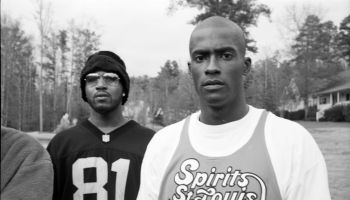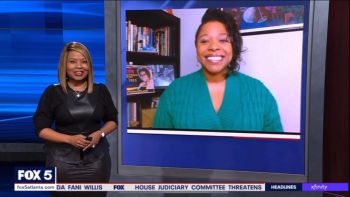Lawyer Benjamin Crump depicts Howard Morgan’s (pictured) case as the height of calumny, or the slander of an innocent man. Illinois Cook County Public Defender Lester Finkle says the case represents the epitome of racial bias in America, and Rosalind Morgan, Howard’s wife, is calling for the courts to right a wrong committed against her husband, the Black former Chicago police officer who was shot 28 times by four White officers on the way home from work. And to add insult to injury, Howard ended up being the one convicted of attempting to murder them.
RELATED: Help! Chicago Wife Fights To Free Husband Who Was Shot By Police 28 Times
Last month, the Illinois State Appellate Court upheld Morgan’s conviction on four counts of attempted first-degree murder of the police officers. He was sentenced to 40 years in prison, although he was shot 21 times in the back and seven times about the body.
Now, in what advocates say could be the last chance to right the injustice, Finkle will file papers Thursday in the Illinois Supreme Court appealing the appellate court decision. Finkle told NewsOne that circumstances of the case reek of racial bias, “He was shot 28 times by four White police officers after he was supposedly stopped for a traffic violation.” There is no evidence that he ever fired a weapon.
Crump, who also represented Trayvon Martin’s family, joined the case after meeting Rosalind Morgan last June at Operation PUSH in Chicago. Crump says it’s critical for the Supreme Court to review the case, “We just have to pray because the Supreme Court gets many, many requests,” he told NewsOne. “They only pick about 10 percent of all requested cases. We won’t find out for another 30 days after the filing whether they will grant us the right to be heard. If they grant the appeal, we still have to convince them to overturn his 40-year conviction. He is 62 years old, has no criminal history whatsoever, and his ability to ambulate has been greatly compromised because of all of the bullet wounds.”
The appeal will argue double jeopardy, which prohibits a defendant from being tried on the same charges after a legitimate acquittal, Finkle said. He will also contend that allegations of misconduct on the part of the White police officers should have been allowed in court. During the second trial, defense lawyers were unfairly blocked from asking prospective jurors about their feelings on whether some Chicago police officers have a bias against Blacks.
Indeed, the case raises questions about the value of Black lives by the justice system and the medi, Crump says, “I just don’t think the White media cares about Black life and there has never been a more telling example of that than in this Howard Morgan case, because when you really think about it, what more can you do? You’re a police officer, you don’t commit any crimes, and you’re honorable. What more could he have done? Where is the outrage? Where is the nonstop media coverage?”
The lack of media attention and coverage of the case could also be because Morgan survived to tell his story — unlike Trayvon Martin who was shot and killed by George Zimmerman as he walked home from the store in his Florida community.
“Trayvon Martin cannot speak from the grave,” Rosalind told NewsOne. “I believe his spirit cries out and I believe his spirit has transcended itself through Howard Morgan. If you are in the grave, you cannot speak and say exactly what happened. Mr. Morgan is alive, and he can tell you exactly what happened to him that night. If they take the word and the story of the four Caucasian officers who tried to assassinate him over that of a seasoned African-American police officer with no prior criminal record, what does it say about our justice system? And people, do you really care about another human’s life? This is a human being and he deserves to live again. Why do they want to kill Mr. Morgan? Why not let him live?”
Rosalind said it would be a grave injustice if the Supreme Court fails to overturn Morgan’s conviction. She described her husband as “a good man, a beautiful husband, my dearest friend.” She said he served as a church deacon, worked as a Chicago Police officer for 8.5 years with more than 25 honorable mentions, and worked for Burlington Northern Railroad Santa Fe for 13.5 years, where he also had a good record.
“I pray that the world will know that this innocent man deserves a second chance to live outside of those prison walls and to be free again,” she said.
The couple, married for 40 years, have two adult daughters and three grandchildren, ages 18, 12, and 6. “My husband took care of the 6-year-old from the time he was 6 weeks old until he had to leave for prison,” Rosalind said. “And he [the 6-year-old] speaks of his grandfather every day.”
Rosalind said it’s been painful to watch her once-strong man deteriorate behind bars, suffering from the gunshot wounds. According to her, Howard has lost hair and suffers from debilitating headaches, arthritis, and heart palpitations. He was hobbled in both legs by the shooting, so he is forced to get around with a cane. The family has filed a civil suit against the city, which is dependent on the outcome of the Supreme Court appeal.
“It’s hurtful when I leave after visiting him,” she said. “I know [about] the strip search cavity searching that he has to endure. It’s overwhelmingly depressing, but it’s a journey I have to travel until my husband is free.”
The case is emblematic of the racial inequality in America, Crump argues. If a law abiding man, who was a police officer, can be pulled over for Driving While Black, “what chance do our little Black boys and girls have for getting pulled over indiscriminately for Driving While Black? That’s what compelled me to get involved so that I could try to use whatever platform I have to right this terrible injustice.”
Howard’s shooting occurred about 12:45 a.m. on a cold and brisk day in February 2005 during a traffic stop on Chicago’s West Side. What happened next represents the heart of the case: Police say Morgan, who was on the way home, opened fire with his service weapon when officers tried to arrest him, which caused them to shoot him 28 times.
But an independent eyewitness testified during his first trial in 2007 that Morgan never fired a weapon, according to a petition at Change.org. At the time, Howard was charged with four counts of attempted first-degree murder, three counts of aggravated battery with a firearm and one count of aggravated discharge of a firearm.
“He had no gunshot residue on his hand, and they could not find the White officer’s bullet proof vest that they said Mr. Morgan fired the bullet in to,” Crump said. “We’re just supposed to take the word of the four White police officers? That’s really troubling and so is the fact that he did not have any gunshot residue on his hand. It’s also telling that he never fired his gun.”
Crump said that police destroyed Morgan’s van, which had more than 100 shots in it and they didn’t collect any of the bullet casings from the police officers. “The one thing we do know is that the four officers fired over 100 shots,” he said. “Twenty eight of them hit Mr. Morgan, 21 in the back, seven in the front.
A jury acquitted Morgan of the two counts of aggravated battery as well as the count of aggravated discharge of a firearm. The jury, however, was hung on the other five remaining counts, after which Judge Clayton Crane, the presiding judge, declared a mistrial.
Howard was tried in 2012 on the remaining charges and convicted.
Assistant State’s Attorney Dan Groth described Howard as a “sociopath” for trying to murder four uniformed police officers, according to the Chicago Sun-Times.
The double jeopardy law, as outlined in the 5th Amendment of the U.S. Constitution, restricts government from re-litigating against the same defense, even if the jury is hung on other counts, Finkle and advocates argue. As a result, Morgan should never have been tried a second time in 2012. Never mind the fact, Rosalind Morgan argues, that there was insufficient evidence to sustain a conviction.
“They had to concoct this story to justify their actions,” she said. “They cannot justify it. The witness said they had him down on his knees and his hands behind his back. And they were shooting him.”
Further, the destruction of evidence, withholding of evidence, and lack of evidence gathered did not allow Morgan the due process of law afforded him under the 14th Amendment, advocates argue.
“Why does the justice system want to kill Howard Morgan?” Crump said. “The 28 bullets weren’t enough to kill him, but the bullets fired from the courtroom just might. Why are the rules different when it’s our brothers and sisters? We want to believe that the system works fairly for everybody, but we keep seeing so many blatant examples of injustice that we have to question does the system apply to us equally?
“It would be a shame if Howard Morgan does not get out of prison and the unimaginable happened that he died in prison,” Crump continued. “That would be the biggest injustice that I can think of. It would be the height of calumny.”
Watch Howard Morgan’s case here:
Howard Morgan: Black Chicago Cop Shot 28 Times By White Officers Still Fighting For Justice was originally published on newsone.com














